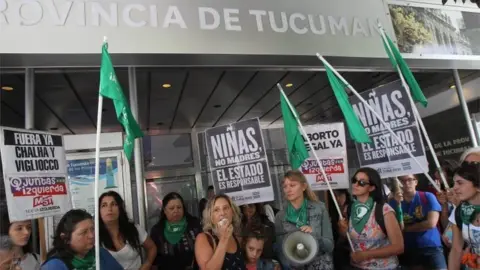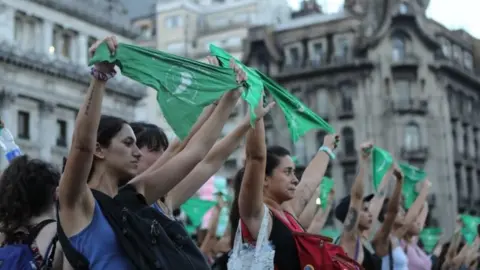Argentine 11-year-old's C-section sparks abortion debate
 EPA
EPANews that doctors performed a caesarean section on an 11-year-old rape victim has reignited a debate on Argentina's abortion rules.
The girl became pregnant after being raped by her grandmother's 65-year-old partner and had requested an abortion.
However, her request was delayed by almost five weeks, and some doctors refused to carry out the procedure.
Eventually doctors carried out a C-section instead, arguing it would have been too risky to perform the abortion.
The baby is alive but doctors say it has little chance of surviving.
The girl was 23 weeks pregnant when - after several delays - she was to have the abortion.
 EPA
EPALocal media report that the girl had been clear from the beginning that she wanted to terminate her pregnancy, telling officials: "I want this thing the old man put inside me taken out."
Abortion is legal in Argentina in cases of rape or if the mother's health is in danger, but in the case of the 11-year-old girl uncertainty about who her legal guardian was caused delays.
The girl's mother agreed with her daughter's wishes but because the girl had been placed in the grandmother's care some time earlier, the mother's consent was at first deemed not enough.
However, because the grandmother had been stripped of her guardianship for co-habiting with the rapist, she could not provide the necessary consent either.
By the time the issue had been settled, the girl was in the 23rd week of her pregnancy.
'Torture'
Further problems surfaced when a number of doctors at the local hospital refused to carry out the procedure, citing their personal beliefs.
On Tuesday, the health authorities in the northern state of Tucumán instructed the hospital director to follow a family judge's decision and to carry out the "necessary procedures to attempt to save both lives".
The family court which the statement quoted has since come forward to say it had made no mention of saving two lives.
The doctors who performed the C-section said they did so not because of the instruction to "save both lives" but because the abortion would have been too risky.
But human rights groups Andhes puts the blame on the Tucumán state health authorities, and pro-choice groups have said that what happened to the girl amounted to "torture".
Abortion is a contentious issue in Argentina and this latest incident comes six months after a divisive debate about whether abortions should be legalised in the first 14 weeks of pregnancy.
A bill to that effect was defeated in the senate, much to the dismay of pro-choice groups which had been campaigning for a loosening of the laws for years.
